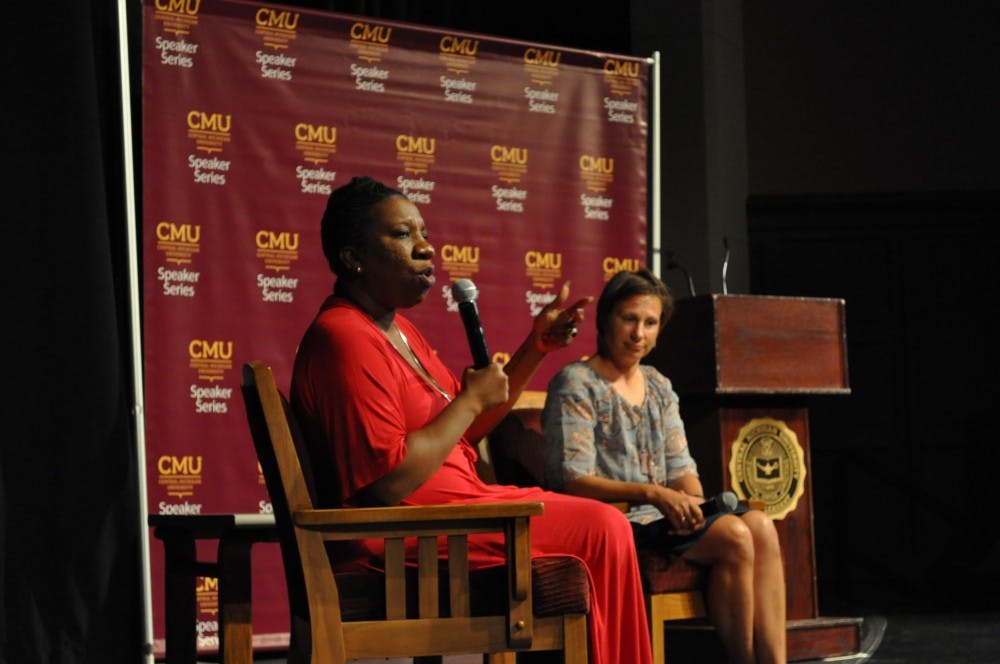#MeToo founder sparks passion for sexual violence awareness
Burke spoke in Plachta Auditorium Monday evening.

#MeToo Founder Tarana Burke and Teacher Education and Professional Development faculty member Shane Cavanaugh spoke about sexual violence and surviving on Sept. 17 in Plachta Auditorium.
#MeToo Founder Tarana Burke provided a wealth of knowledge about the topic of sexual violence and surviving abuse.
Her light-hearted jokes, and powerful red dress, caught the attention of the audience as she sparked a conversation on a serious topic plaguing more than just college campuses. Burke elaborated on the #MeToo movement and how it's changed, especially in the eyes of the media, during the past year.
She said the movement didn't begin as a "witch hunt." The core of the movement lies in the community of sexual violence survivors who want to be believed, understood and heal, Burke said.
She claims that the current systems on college campuses, within workplaces and in our political system are not the answer. The true root of the problem lies in power and privilege that give individuals the access to harm others, she said.
Central Michigan University President Robert Davies was directly addressed by Burke. She told him if he's uncomfortable or unhappy with the climate on campus, "you need to change it."
"If you don't feel safe here, or feel vulnerable here, you have the voice to change that and you have the power to change that," she said during the event.
When Burke experienced sexual violence 40 years ago, she didn't know terms like "survivor." She said she referred to herself as a victim until someone taught her otherwise.
Now, the mature woman who endured sexual assault as a child in the Bronx, is not only a survivor. Burke said her identity was shaped by her family members who were activists.
She informed the audience one in four women are sexually assaulted on college campuses each year.
She said survivors can feel isolated when people say "I'm sorry that happened to you." Rather, the #MeToo founder insisted on using words that help survivors feel like they are part of a community and understood by those who may not have had similar experiences.
"The reason why I use words like dignity and humanity so emphatically is because I think people who haven't been sexually assaulted don't understand what it does, but everyone wants to have their dignity," Burke said. "Everyone wants to be treated like a human being. Everyone can relate to that."
Lansing graduate student Jordan X Evans said he was interested in the event due to men's role in the problem of sexual violence.
"I need to be doing more, especially as a male," Evans said. "It makes sense for me to be here. It makes sense to have more guys here as well, they're the ones who are the perpetrators of violence and sexual assault."
He continued, "guys really don't think that they have an issue, and especially on college campuses where they're still growing and learning to be more mature. They don't think they need to be here."
He said the branding of the movement is enough, but men need to understand the importance of part of the solution.
Organization of Women Leaders President Emily Jones said she encouraged members of her organization to attend the event.
"Sexual assault and sexual violence is such a huge issue, especially in our country." she said. "We need to be empowering survivors to really feel comfortable and come out and to tell their stories, whenever that may be for them."
She said seeing a leader like Burke has the potential to teach members of her organization about founding their own movements, and inciting change in their communities.
Burke said she hopes some young, bright visionary can take over her job in the next five years. She encouraged advocates and activists to take the movement to the next level by providing fresh ideas.
"It's not about one person," Burke said. "Let's work together. Let's heal together. If you're ready to do that part - if you're ready to do the work to end sexual violence - I can only leave you with these two words: 'me too.'"



